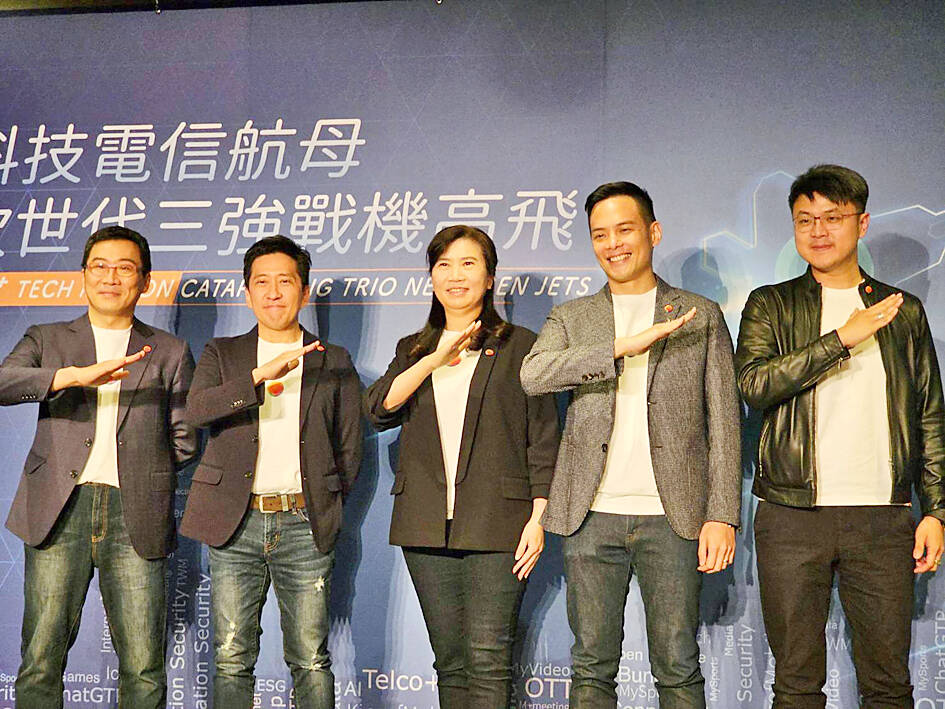Taiwan Mobile Co (台灣大哥大) aims to expand revenue by about 16 percent to about NT$200 billion (US$6.49 billion) this year at the earliest, benefiting from rapidly growing nontraditional services such as financial products, online gaming and its momo coin, it said yesterday.
Last year, Taiwan Mobile’s revenue grew at an annual rate of 10 percent to a record-high NT$172.2 billion after its average revenue per user climbed for eight consecutive quarters to NT$697 during the fourth quarter of last year.
With new products such as “buy now, pay later” services, games and wider usage of momo coins, the company expects to soon reach the NT$200 billion mark, company president Jamie Lin (林之晨) told a news conference in Taipei.

Photo: CNA
Telecom financial services are among the fastest-growing businesses, Lin said.
Taiwan Mobile is seeking to work with partners in the Philippines, Indonesia and Vietnam to expand the usage of its momo coin to the Southeastern Asian countries, where many people do not have bank accounts or credit cards, he said.
Less than 10 percent of people in those countries have a bank account and only 2 to 4 percent of them have a credit card, he said.
The telecom expects a “leapfrog effect” in the emerging countries as they embrace new telecom financial services and skip traditional offerings, which have not taken root yet, he said.
The company has set a medium-to-long term goal to expand its financial services business to NT$10 billion, financial department vice president Vincent Wu (吳建頤) said.
This year, the company aims to expand its user base of momo coins by 10 to 20 percent from 600,000 last year, aided by new services, Wu said.
Last month, the company launched its “buy now, pay later” offerings at e-commerce subsidiary Momo.com Inc (富邦媒體) and is in talks with potential partners to expand the scope of the services beyond Taiwan Mobile subscribers, he said.
Since its launch, the service has attracted more than 3,000 customers, Taiwan Mobile said.
The company said it expects the pay-later services to be available for most local consumers next year.
Online gaming is also a strong growth driver for the company’s revenue, it said.
It last quarter obtained exclusive rights in Taiwan for two new game titles related to the League of Legends franchise.
That helped boost monthly average users by 310 percent year-on-year last quarter and lifted transactions by 346 percent annually, it said.
Contributions from online gaming spiked 1,109 percent last quarter in terms of earnings before interest, taxes, depreciation and amortization from a year earlier, the telecom said.
That forecast did not factor in contributions from Taiwan Star Telecom Co (台灣之星), the acquisition of which is pending approval from the Fair Trade Commission.
Taiwan Mobile hopes to receive approval from the competition watchdog next quarter at the earliest, Lin said.

Taiwan will prioritize the development of silicon photonics by taking advantage of its strength in the semiconductor industry to build another shield to protect the local economy, National Development Council (NDC) Minister Paul Liu (劉鏡清) said yesterday. Speaking at a meeting of the legislature’s Economics Committee, Liu said Taiwan already has the artificial intelligence (AI) industry as a shield, after the semiconductor industry, to safeguard the country, and is looking at new unique fields to build more economic shields. While Taiwan will further strengthen its existing shields, over the longer term, the country is determined to focus on such potential segments as

UNCERTAINTY: Innolux activated a stringent supply chain management mechanism, as it did during the COVID-19 pandemic, to ensure optimal inventory levels for customers Flat-panel display makers AUO Corp (友達) and Innolux Corp (群創) yesterday said that about 12 to 20 percent of their display business is at risk of potential US tariffs and that they would relocate production or shipment destinations to mitigate the levies’ effects. US tariffs would have a direct impact of US$200 million on AUO’s revenue, company chairman Paul Peng (彭雙浪) told reporters on the sidelines of the Touch Taiwan trade show in Taipei yesterday. That would make up about 12 percent of the company’s overall revenue. To cope with the tariff uncertainty, AUO plans to allocate its production to manufacturing facilities in

COLLABORATION: Given Taiwan’s key position in global supply chains, the US firm is discussing strategies with local partners and clients to deal with global uncertainties Advanced Micro Devices Inc (AMD) yesterday said it is meeting with local ecosystem partners, including Taiwan Semiconductor Manufacturing Co (TSMC, 台積電), to discuss strategies, including long-term manufacturing, to navigate uncertainties such as US tariffs, as Taiwan occupies an important position in global supply chains. AMD chief executive officer Lisa Su (蘇姿丰) told reporters that Taiwan is an important part of the chip designer’s ecosystem and she is discussing with partners and customers in Taiwan to forge strong collaborations on different areas during this critical period. AMD has just become the first artificial-intelligence (AI) server chip customer of TSMC to utilize its advanced

While China’s leaders use their economic and political might to fight US President Donald Trump’s trade war “to the end,” its army of social media soldiers are embarking on a more humorous campaign online. Trump’s tariff blitz has seen Washington and Beijing impose eye-watering duties on imports from the other, fanning a standoff between the economic superpowers that has sparked global recession fears and sent markets into a tailspin. Trump says his policy is a response to years of being “ripped off” by other countries and aims to bring manufacturing to the US, forcing companies to employ US workers. However, China’s online warriors